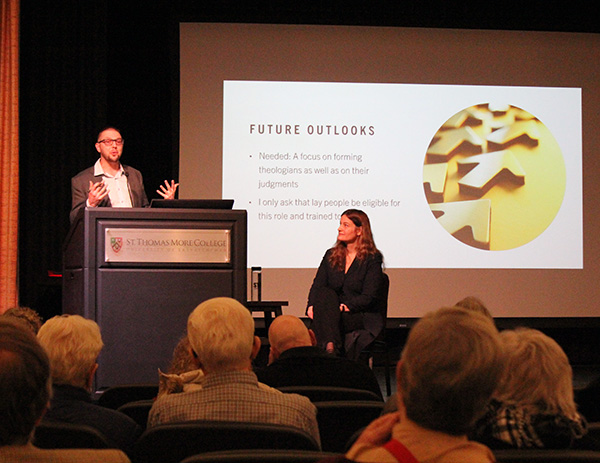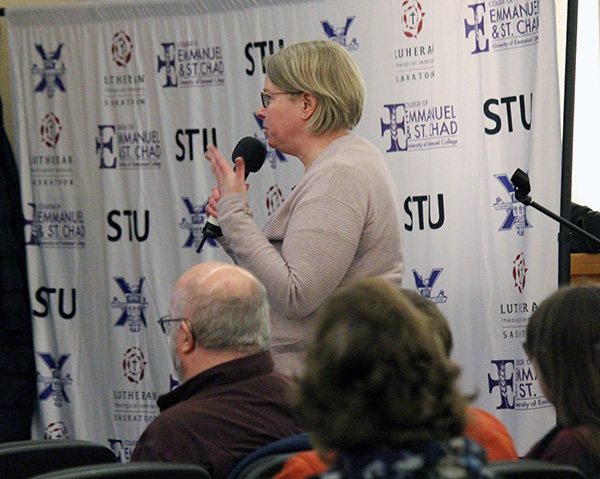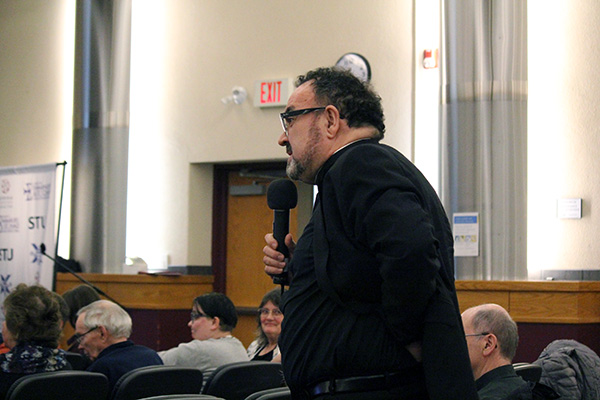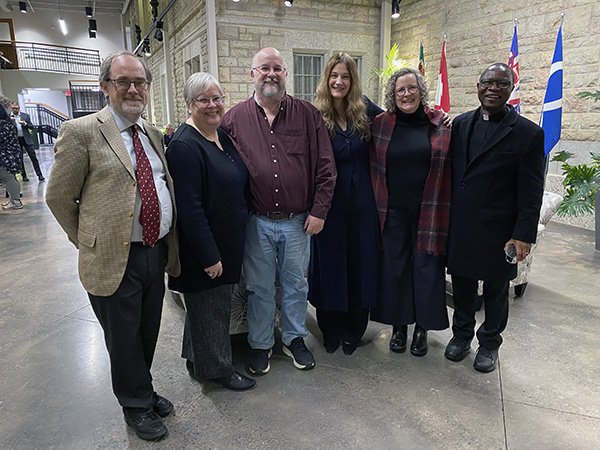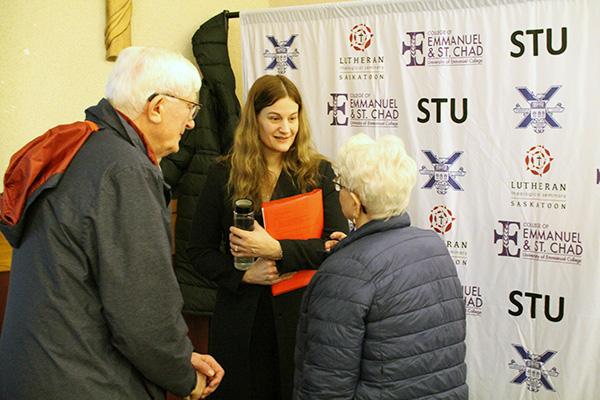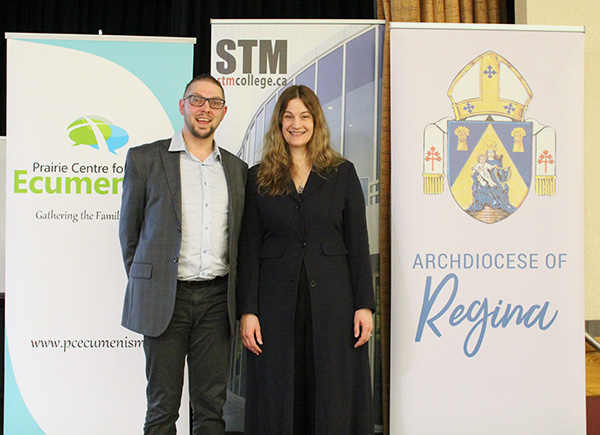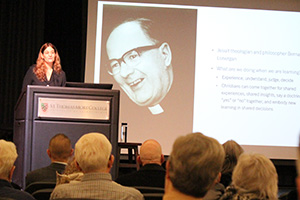
De Margerie Lecture Series showcases critical roles lay people, doctrine have in ecumenism
Petersen Finch details success of Clarkston Dialogues with help from prayer, goodwill and Holy Spirit
By Paul SinkewiczThere is a deep hunger among laypeople of Christian faith to roll up their sleeves and take part in the work of ecumenism, according to Rev. Dr. Karen Petersen Finch.
They only need the tools and the opportunities.
That was the theme of her twin lectures and followup seminars while she was a guest in Saskatchewan for the annual De Margerie Ecumenical Lectures on Christian Reconciliation and Unity.
The Annual De Margerie Lecture, held during the Week of Prayer for Christian Unity, is now in its 12th year -- and it is now plural. It has grown into a two-part series with one lecture in Regina hosted at Campion College on Jan. 24, and one in Saskatoon, hosted by St. Thomas More College, on Jan. 25. Both lectures were also livestreamed.
Started in 2013 by the Roman Catholic Diocese of Saskatoon and St. Thomas More College, it is also now sponsored by six different groups with a deep interest in promoting Christian unity: the Prairie Centre for Ecumenism, the Saskatoon Theological Union, the Archdiocese of Regina, the Diocese of Saskatoon, Campion College and the Leslie and Irene Dubé Chair in Catholic Studies at St. Thomas More College.
Petersen Finch is an ecumenical theologian and professor of Pastoral Leadership at The Presbyterian College in Montréal.
Her twin talks were the product of her book Grassroots Ecumenism: The Way of Local Christian Reunion, and drew enthusiastic crowds and lively discussions afterward.
The message of the evening was that ecumenism is more than a theoretical subject, it is a quest to identify how we can overcome our differences intellectually, culturally and in terms of church structure. Petersen Finch believes it requires that separated Christians learn to do theology together and that theological experts must not be the only actors in ecumenical dialogue, but lay people can, and must, join them.
“During my postdoctoral studies at Boston College I had the dream of what would happen if we flipped ecumenical practice upside down and instead of having the professional theologians do the theology and hoping it would trickle down, what if we reversed that and we put the doctrinal conversations at the grassroots level?” Petersen Finch said.
“There are two surprises in this book. The first surprise is the identification of lay people as agents of ecumenical dialogue – faith-and-order style ecumenical dialogue.”
“The second surprise -- which is an even greater surprise -- is the role of doctrine in this project. This is really a project that is adds up to a proposal for local doctrinal dialogue by the whole people of God -- lay people and clergy together -- but the special emphasis is on the lay people since they, I feel, are stewards of doctrine who don't often get to live out that role in the lives of all of our churches.”
She related the experience she had in September 2020 working with two churches across the street from each other in Clarkston, Washington.
The Clarkston Dialogues was five weeks of training and practice in ecumenical dialogue with Holy Family Parish of Clarkston and First Presbyterian Church of Clarkston.
Petersen Finch said the goals laid out during the Clarkston Dialogues were:
- to learn the skills of dialogue that make room for the Holy Spirit – openness, transparency, and generativity
- to understand our own Church's teachings better as well as those of our neighbor Church
- to come together honestly and respectfully without softening our differences
- to study the unity reports that national and international ecumenists have previously written
- and to proclaim the gospel together locally by word and by deed
Petersen Finch said rather than putting up barriers, involving deeply held beliefs about doctrine in ecumenical conversations between different churches creates a kind of energy and a movement, but it requires a lot of loving respect because you are dealing with the deepest judgments of truth and value of Christian brothers and sisters.
She said local dialogue is a work of the Holy Spirit that can deepen faith in Jesus Christ and commitment to his gospel, and she saw this happening in both churches that participated.
“The presence and power of the Holy Spirit was palpable in the Clarkston dialogues,” she said. “Yes, we had times where we were not in active dialogue because we were doing training, either in one another's theologies or in the practice of dialogue, but when you come into an open dialogue you might think that if it's about doctrine it's like a script that's already written. That is so not true. We never knew what was going to happen next. You would hear very reformed sounding things coming out of the Catholics and very Catholic sounding things coming out of the reformed. It's something where you need help, and we depended on the Spirit, and we prayed. We prayed together. And as I told the group last night, there was this absolute delight in praying together that these two groups of Christians felt.”
“When they first started, they felt like it was mischief-making and maybe they shouldn't be doing it, and then they got to really love it and they would just pray and pray and pray. It was the best thing.”
The evening included an energetic analysis by respondent Dr. Brett Salkeld, of Regina, who had featured Dr. Petersen Finch on his podcast recently, and who himself has a deep interest in the topic of Doctrine as the Fuel of Renewal in the ecumenical movement.
The Regina Lecture was titled Re-imagining Lay People as Stewards of Doctrine, with Dr. Gertude Rompré, Director of Mission and Ministry at STM College, providing the response.
The two lectures are available to watch online by going to the Irene and Doug Schmeiser Centre channel on YouTube at: https://www.youtube.com/@SchmeiserCentre
The five-part YouTube series on the Clarkston Dialogues is available at: https://www.youtube.com/watch?v=_jXASDhpWzE&t=184s
*****
The De Margerie Lecture Series: Named in honour of Fr. Bernard de Margerie, a priest of the Diocese of Saskatoon who has dedicated his whole life in ministry to the promotion of Christian unity, and who was one of the founders of the Prairie Centre for Ecumenism based in Saskatoon.
